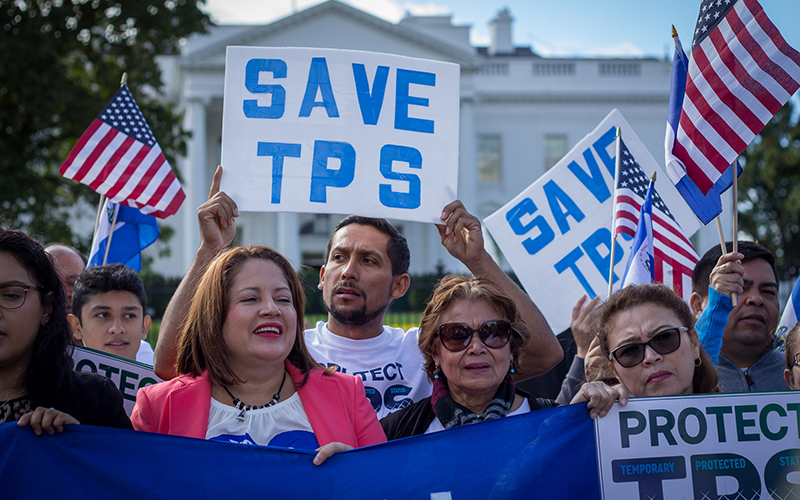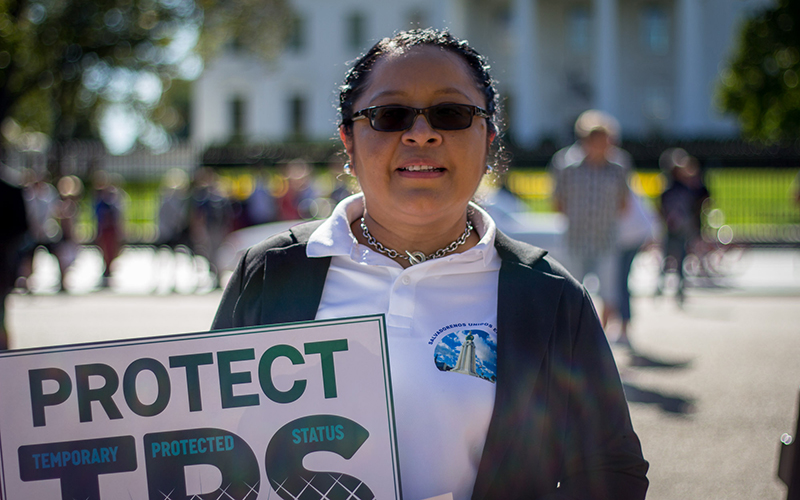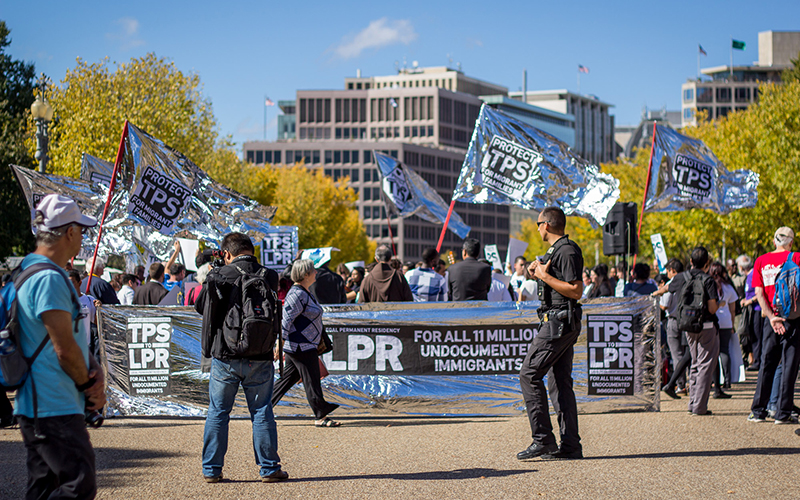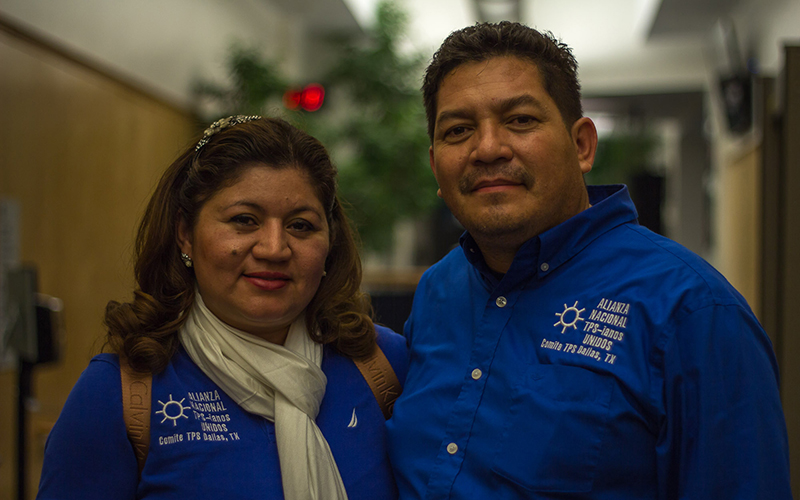
Immigrants with temporary protective status rallied outside the White House Tuesday for an extension of the TPS program, which could be allowed to expire under the Trump administration. (Photo by Adrienne St. Clair/Cronkite News)

Yesenia Chavarria is one of 1,000 Salvadorans in Arizona covered – for now – by temporary protective status. She joined other recipients from across the country to rally for an extension of the program. (Photo by Adrienne St. Clair/Cronkite News)

Scores of immigrants rallied outside the White House to extend the TPS program, which currently protects immigrants from 10 countries. They said their cause is often overshadowed by the DACA debate. (Photo by Adrienne St. Clair/Cronkite News)

Edwin Murillo and Mily Rivas traveled to Washington from Dallas because they worry about what will happen to their two American-born children if Murillo and Rivas lose their protected status. (Photo by Adrienne St. Clair/Cronkite News)
WASHINGTON – Yesenia Chavarria traveled from Arizona and joined scores of immigrants outside the White House Tuesday to plead for an extension of their temporary protected status, a problem one expert calls “the most important issue most people have never heard of.”
The program currently protects at least 300,000 immigrants – 1,100 of them in Arizona – who cannot return to their home countries because armed conflict, environmental disasters or other “extraordinary and temporary conditions” threatened their safety.
But countries covered by the program have to be renewed regularly, and the current round of protections could expire beginning in January. That would mean deportation for people like Chavarria, who came from El Salvador 17 years ago.
“We’re here and we need their help,” Chavarria said of efforts to lobby lawmakers. “We can’t go talk to the president, but they are close.”
Countries’ designations are reviewed every six to 18 months and for countries like El Salvador, renewals have been approved for years. But advocates worry that things could change under President Donald Trump and his administration’s tough talk on immigration.
The first test will come Nov. 5, when TPS holders from Honduras and Nicaragua will learn whether their countries’ status will be renewed on Jan. 5. TPS beneficiaries from other countries expect that decision will be followed for the other eight countries in the program: El Salvador, Haiti, Nepal, Somalia, South Sudan, Sudan, Syria and Yemen.
Total numbers were not immediately available, but the Center for American Progress said that Hondurans, Haitians and Salvadorans, with 302,000 TPS holders in the U.S., account for more than 90 percent of the total.
Advocates say the plight of TPS holders has been overshadowed by the debate over the Trump administration’s decision to cancel the Deferred Action for Childhood Arrivals program, which protects 800,000 young immigrants from deportation. America’s Voice founder Frank Sharry called TPS “the most important issue most people have never heard of.”
-Cronkite News video by Fraser Allan Best
Mily Rivas, a TPS holder from El Salvador who was in Washington to lobby, said they “need to let other people know, you know, especially the white community, or the rest of the United States,” about the threat to TPS.
“Because most of the people, they talk about DACA, but they don’t know there is another group, too … that is in need of support,” she said after a TPS benefit concert Sunday.
Like DACA recipients, TPS holders point to the potential damage to families if the program goes away. The Center for American Progress said that the 302,000 TPS holders from the three largest countries have 273,200 U.S.-born children. In Arizona, the 1,100 TPS holders have 1,300 children who have been born in this country.
That includes Chavarria, who came to the U.S. with a young son, and currently lives in Peoria with her husband and a daughter who was born here.
TPS holders are authorized to work, drive and own houses and businesses. Chavarria said her husband has worked at the same job for 17 years in Arizona, and Rivas’ husband, Edwin Murillo, owns a heating and air conditioning business in Dallas. Murillo called TPS a “phenomenon” because he said a lot of his neighbors think that he and his wife are U.S. citizens.
“We are the same as every family,” Murillo said.
Except that these families must re-register with U.S. Citizenship and Immigration Services every time their home country’s status is renewed. That includes submitting paperwork, paying fees and undergoing biometric scanning.
In a conference call about TPS last week, Tom Jawitz from the Center for American Progress said TPS holders are some of the most thoroughly vetted people in the country because of the registration process they face every 18 months or less. Jawitz said many TPS recipients would have passed these checks up to 12 or 13 times.
On Sunday, Rivas echoed Jawitz, saying “each time our work permits is renewed, we have to put our fingerprints, so that means they investigate us. They know we are a good people.”
But Murillo said Sunday that where he once thought of the U.S. “like a big brother … this big brother disappeared 20 years ago.”
This is the second time that Chavarria and Murillo traveled to Washington to lobby for TPS. Their latest visit culminated in a news conference and prayer vigil in front of the White House, where chants of “Donald Trump, we’re here to stay” and “Say yes to TPS” rang throughout Lafayette Park.
Despite the uncertainty, Murillo said Tuesday that he’s “totally” hopeful that TPS will be extended.
“But that is not the point,” he said. “We need a permanent solution for us, for our families. I don’t want to come to D.C. every year for the same thing.”